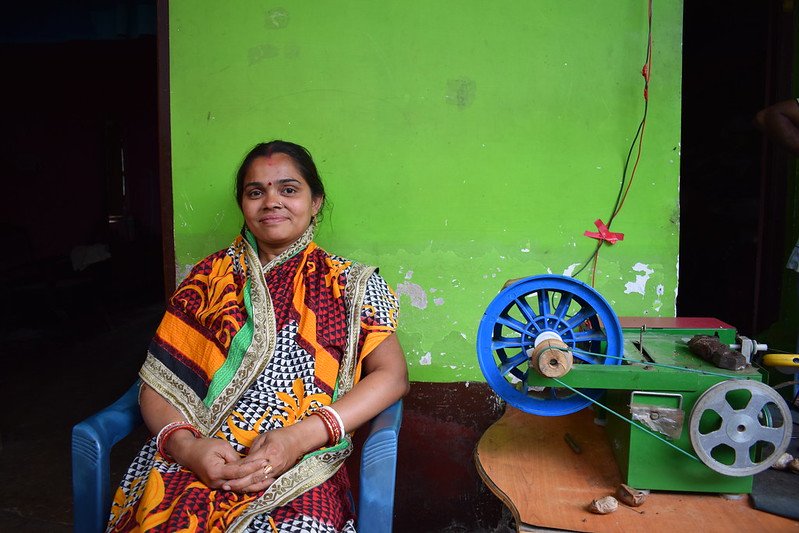SDG # 8 - Decent Work and Economic Growth
SDG #8 - Decent Work and Economic Growth
This month’s Sustainable Development Goal features some sobering numbers indicating how far we have to go to achieve a truly sustainable economy and Decent Work for all. At the same time, SDG#8 Decent Work and Economic Growth is among the Global Goals which businesses can further the most.
Image courtesy of Climate Visuals
Amid the current rising cost of living, and the pandemic-induced financial and economic crisis dubbed the worst since the Great Depression, it is vital that we remind ourselves of the main slogan of Agenda 2030 and the 17 SDGs: No one should be left behind – and this must start with a levelled playing field, fair and safe work environments, and no discrimination in the job market.
Insecure employment relations and volatile terms and conditions mean that many are unable to afford to live on their earnings, or worse are at very real risk of tipping into poverty. Pre-pandemic, 630 million workers were unable to meet their daily needs on their salary and this has inevitably been exacerbated by the pandemic. Simultaneously, since start of the Covid-19 outbreak, global unemployment has grown by 1.2% and is set to remain above pre-pandemic levels until at least 2023 pushing millions below the poverty line.
While some struggle to make ends meet on their hard-earned money others are fully excluded from the job market. About 2 billion only find employment in the informal economy without any social security or legal assurances. Discrimination and prejudice have stopped many from participating in gainful employment - most prominently women, younger people, immigrants, those with disabilities, and any individuals at the intersection of these protected characteristics.
GDP growth has also suffered a blow during the pandemic and since the ongoing war in Ukraine, which is unlikely to recover quickly. That said, global GDP will eventually recover but as SDG#8 Decent work and Economic Growth implies, as long as this growth fails to trickle down into workers’ lives and fails to lead to better opportunities and livelihoods for all, unending, unfocused growth is not what we need. As UN Secretary General, Antonio Guterres said
‘The recovery from the COVID-19 crisis must lead to a different economy’
Luckily, Small and Medium-sized Enterprises have a large role to play in this. When managed correctly, economic progression has the potential to transform both living standards and our relationship to the living world. Inclusive growth will lower poverty levels and end hunger; productive jobs will drive up wellbeing and foster innovation; and these will allow for ambition to grow, and climate action to happen.
SDG#8 Decent Work and Economic Growth – SMEs as the backbone of an inclusive economy
As with all the SDGs, SDG#8 has a number of sub-targets, and it is target 8.3 that speaks best to the SME business community: Promote Policies to Support Job Creation and Growing Enterprises. Job creation and fair conditions are the responsibility of any and all businesses that want to serve their community. Thriving businesses create investment opportunities into entrepreneurship, creativity and innovation which have the ability to create new opportunities outside of the limits of our current economy. To drive change you must…
Ensure that you and your value chain offer decent work. Decent work is defined as work that is productive, fairly renumerated, and includes physical security at work along with long-term social security outside of work. Decent work includes opportunities for personal development and career progression, and it aids the social integration of employees. Providing youth and disadvantaged individuals with opportunities and social protection regardless of contract type is a first step. Vetting your suppliers and inspiring (requiring) them to do the same is an important second.
Level the playing field. All global goals are inseparable and sustainable economic growth cannot happen without gender equality and inclusivity in the workplace. Decent Work must be built on diversity - inclusive of all ethnicities, sexualities, and genders, those with physical and mental disabilities and those of various legal and migration backgrounds. Blind recruitment processes can help eliminate unconscious bias and training can actively deconstruct prejudice while contributing to the personal development of the existing workforce.
Provide not only social protection, but protection in the workplace. Once on board, these people can still face discrimination in the workplace. Ensure you have policies in place that support them, and that allow them to deal with grievances. Survey your workforce for their needs. For example, fair maternity conditions and support are important for gender equality – taking time off has impacted women’s ties to the labour market, as well as put them at risk of increased discrimination. It is important that you ensure fair conditions and that you communicate this to your employees and the wider public to inspire others to follow suit. Part-time and flexible working arrangements for those who have caring responsibilities should come with no discrimination or disadvantage at the workplace. Ensuring this takes a culture change that all employees and employers must be a part of and educated on.
As vital components of the economy, businesses must be the first to act on decent work and economic growth. We have a responsibility for the planet, for the community we operate in, but most importantly for our own people. No one should constantly worry about their own, and their families’ livelihoods and fair employment conditions can change that. Unlocking people’s true potential will only happen in safety where immediate worries about their workplace do not deter energy and resources from innovation, passion, and creativity.
Our blog exploring the UN’s changing focus on the Sustainable Development Goals is published monthly - making the SDGs relevant and applicable to every day business life. Recent pieces look at the complicated, intertwined nature of all 17 SDGs, the concept of peace since December 2021 and the amazing, fragile world around us.
For an overview of all 17 goals, click here.


